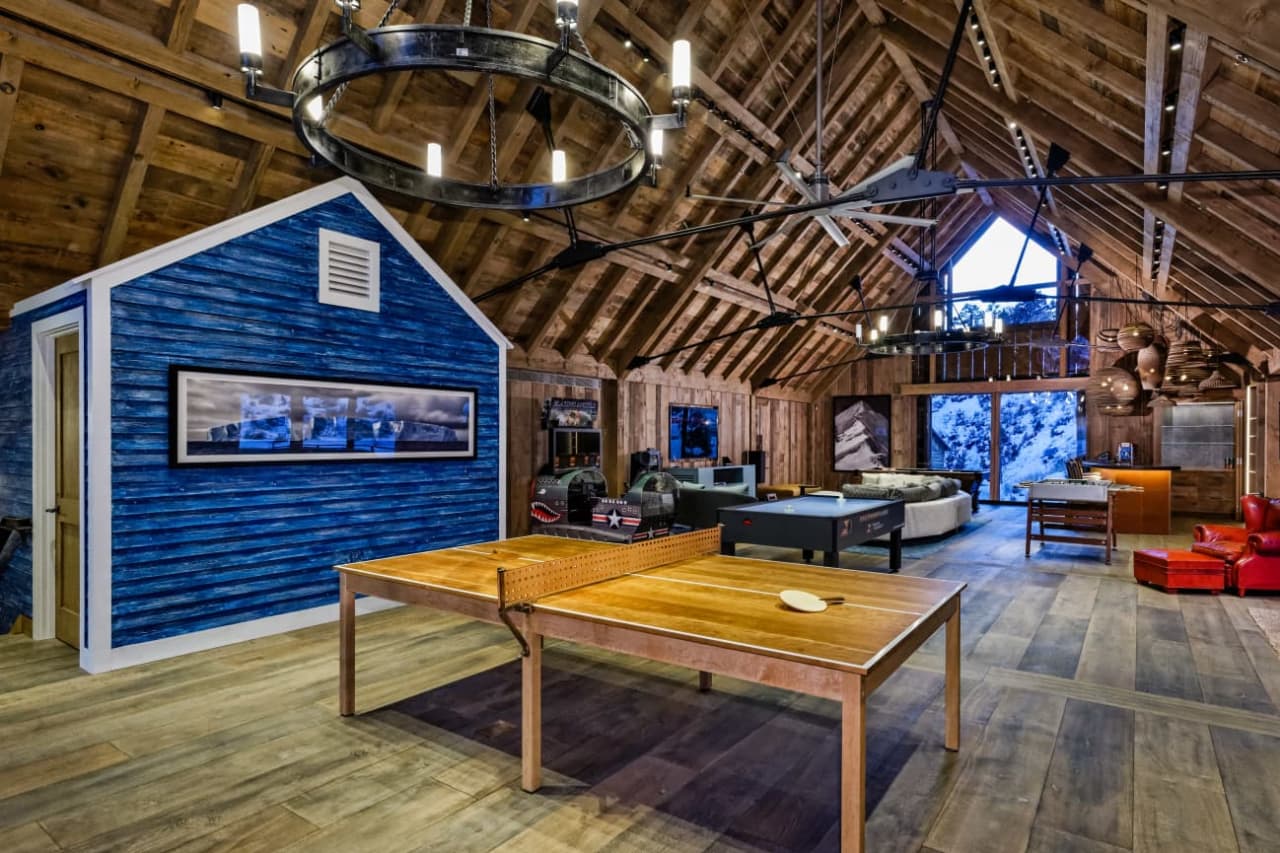An Interior Designer Trick for Adding Architectural Pizazz To A Dull Room
Why settle for safe, predictable wood wainscoting when you can tile a half-wall and choose from a candy-store variety of hard-wearing patterns?
WOOD WAINSCOTING, whether painted or not, inarguably adds architectural interest to a wall, but—unlike tile—rarely does it jolt a room with energy. “Tile wainscoting adds character to a space that’s a bit unexpected, and it’s stood the design test of time,” said Los Angeles designer Caitlin Murray of Black Lacquer Design, noting that the technique has been used for centuries in regions such as Portugal and Mexico. Not all tiles are created equal, however, so we’ve put together this guide.
The Appeal
Among designers’ rationales for running tiles up a wall, practicality tops the list. In bathrooms and kitchens the technique guards drywall from, respectively, splashing water and errant olive oil. And when chairs are pulled back too exuberantly in dining rooms, the durable material won’t get scuffed. New York City architect Alexandra Barker defaults to tile for heavily trafficked areas, such as this Brooklyn brownstone vestibule. The large cement hexagons she chose not only safeguard the floor and lower wall, but their yellow-and-white pattern gives the entry its own vibe.
Why apply blandly safe, low-impact wood wainscotting when you could choose from a vast array of personable tile patterns? A tiled half wall “adds a decorative architectural detail to a space, especially welcome when you are working with a white-box room,” said Ms. Murray.
The Tips
You might need to commit to a scheme with just a tile or two in hand, so carefully visualize how a pattern will look when it’s repeated. “Some large or busy patterns may be too jarring and dizzying for small spaces,” warned Ms. Murray.
For the bathroom of a client’s home, Ms. Murray clad half a wall in small black hexagonal tiles, a low-cost designer favourite. On the floor, she set 5-inch squares of blue and white cement tiles in an elaborate pattern of octagons. If you introduce two tile designs in a space, she said, you want them to duet not duel. “While the pairing of blue and black is a bit surprising,” she said, “both patterns are geometric, so in a classic design sense they play well together.”
Encaustic cement tiles, though the rage of late, are not for everyone. “Cement takes on a worn, aged appearance over time, which some people prefer, but if you like things pristine, porcelain is a better choice,” said Ms. Murray.
We won’t advise on glossy versus matte finishes. That’s a personal preference, as is grout colour, though Ms. Murray cautions that white grout on floors will muddy and need upkeep.
The transition where the material ends and wall begins requires judicious thought. Ms. Murray topped her hex-tile wainscoting with a single row of solid black, traditional bullnose subway tile for a punctuating finish, while Ms. Barker tacked simple wood trim painted the same sapphire blue as the wall above, for an edge that disappears.
The Caveats
Painting the wall is a lower commitment than any wainscoting, of course. And masonry doesn’t come cheap. Ms. Barker estimates that installation will set you back $13 to $20 a square foot. But Ms. Murray notes you can curtail the budget when it comes to tile. While Zellige tiles from Clé Tiles in San Rafael, Calif., run almost $44 a square foot, porcelain penny and hexagon designs are affordable and look great on a wall or floor, she said. In solid colours, these shapes start at $45a square foot. And don’t tile a banquet hall: “Remember, a little tile can really make a statement, so it’s a great option for smaller spaces,” she said.
Reprinted by permission of The Wall Street Journal, Copyright 2021 Dow Jones & Company. Inc. All Rights Reserved Worldwide. Original date of publication: April 7, 2022.
 Copyright 2020, Dow Jones & Company, Inc. All Rights Reserved Worldwide. LEARN MORE
Copyright 2020, Dow Jones & Company, Inc. All Rights Reserved Worldwide. LEARN MORE
This stylish family home combines a classic palette and finishes with a flexible floorplan
Just 55 minutes from Sydney, make this your creative getaway located in the majestic Hawkesbury region.
As Paris makes its final preparations for the Olympic games, its residents are busy with their own—packing their suitcases, confirming their reservations, and getting out of town.
Worried about the hordes of crowds and overall chaos the Olympics could bring, Parisians are fleeing the city in droves and inundating resort cities around the country. Hotels and holiday rentals in some of France’s most popular vacation destinations—from the French Riviera in the south to the beaches of Normandy in the north—say they are expecting massive crowds this year in advance of the Olympics. The games will run from July 26-Aug. 1.
“It’s already a major holiday season for us, and beyond that, we have the Olympics,” says Stéphane Personeni, general manager of the Lily of the Valley hotel in Saint Tropez. “People began booking early this year.”
Personeni’s hotel typically has no issues filling its rooms each summer—by May of each year, the luxury hotel typically finds itself completely booked out for the months of July and August. But this year, the 53-room hotel began filling up for summer reservations in February.
“We told our regular guests that everything—hotels, apartments, villas—are going to be hard to find this summer,” Personeni says. His neighbours around Saint Tropez say they’re similarly booked up.
As of March, the online marketplace Gens de Confiance (“Trusted People”), saw a 50% increase in reservations from Parisians seeking vacation rentals outside the capital during the Olympics.
Already, August is a popular vacation time for the French. With a minimum of five weeks of vacation mandated by law, many decide to take the entire month off, renting out villas in beachside destinations for longer periods.
But beyond the typical August travel, the Olympics are having a real impact, says Bertille Marchal, a spokesperson for Gens de Confiance.
“We’ve seen nearly three times more reservations for the dates of the Olympics than the following two weeks,” Marchal says. “The increase is definitely linked to the Olympic Games.”

Getty Images
According to the site, the most sought-out vacation destinations are Morbihan and Loire-Atlantique, a seaside region in the northwest; le Var, a coastal area within the southeast of France along the Côte d’Azur; and the island of Corsica in the Mediterranean.
Meanwhile, the Olympics haven’t necessarily been a boon to foreign tourism in the country. Many tourists who might have otherwise come to France are avoiding it this year in favour of other European capitals. In Paris, demand for stays at high-end hotels has collapsed, with bookings down 50% in July compared to last year, according to UMIH Prestige, which represents hotels charging at least €800 ($865) a night for rooms.
Earlier this year, high-end restaurants and concierges said the Olympics might even be an opportunity to score a hard-get-seat at the city’s fine dining.
In the Occitanie region in southwest France, the overall number of reservations this summer hasn’t changed much from last year, says Vincent Gare, president of the regional tourism committee there.
“But looking further at the numbers, we do see an increase in the clientele coming from the Paris region,” Gare told Le Figaro, noting that the increase in reservations has fallen directly on the dates of the Olympic games.
Michel Barré, a retiree living in Paris’s Le Marais neighbourhood, is one of those opting for the beach rather than the opening ceremony. In January, he booked a stay in Normandy for two weeks.
“Even though it’s a major European capital, Paris is still a small city—it’s a massive effort to host all of these events,” Barré says. “The Olympics are going to be a mess.”
More than anything, he just wants some calm after an event-filled summer in Paris, which just before the Olympics experienced the drama of a snap election called by Macron.
“It’s been a hectic summer here,” he says.

AFP via Getty Images
Parisians—Barré included—feel that the city, by over-catering to its tourists, is driving out many residents.
Parts of the Seine—usually one of the most popular summertime hangout spots —have been closed off for weeks as the city installs bleachers and Olympics signage. In certain neighbourhoods, residents will need to scan a QR code with police to access their own apartments. And from the Olympics to Sept. 8, Paris is nearly doubling the price of transit tickets from €2.15 to €4 per ride.
The city’s clear willingness to capitalise on its tourists has motivated some residents to do the same. In March, the number of active Airbnb listings in Paris reached an all-time high as hosts rushed to list their apartments. Listings grew 40% from the same time last year, according to the company.
With their regular clients taking off, Parisian restaurants and merchants are complaining that business is down.
“Are there any Parisians left in Paris?” Alaine Fontaine, president of the restaurant industry association, told the radio station Franceinfo on Sunday. “For the last three weeks, there haven’t been any here.”
Still, for all the talk of those leaving, there are plenty who have decided to stick around.
Jay Swanson, an American expat and YouTuber, can’t imagine leaving during the Olympics—he secured his tickets to see ping pong and volleyball last year. He’s also less concerned about the crowds and road closures than others, having just put together a series of videos explaining how to navigate Paris during the games.
“It’s been 100 years since the Games came to Paris; when else will we get a chance to host the world like this?” Swanson says. “So many Parisians are leaving and tourism is down, so not only will it be quiet but the only people left will be here for a party.”
This stylish family home combines a classic palette and finishes with a flexible floorplan
Just 55 minutes from Sydney, make this your creative getaway located in the majestic Hawkesbury region.






















